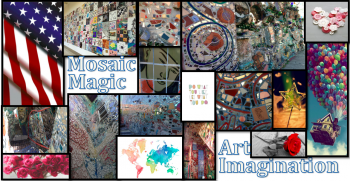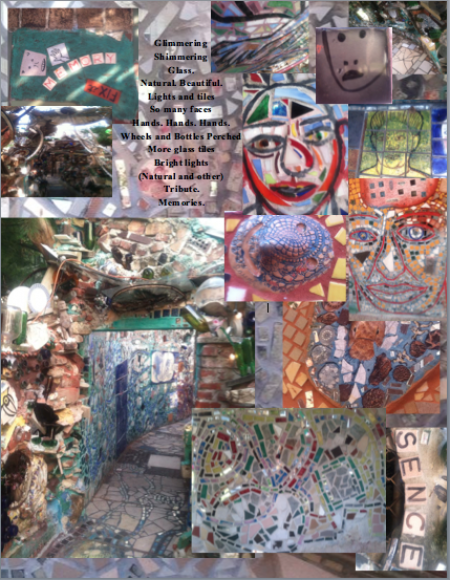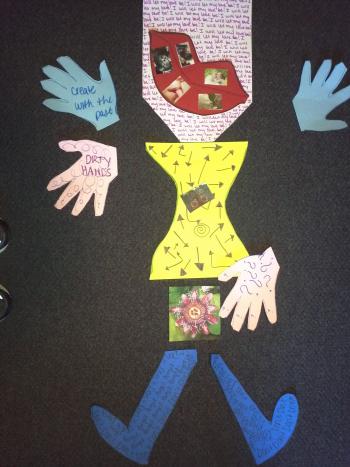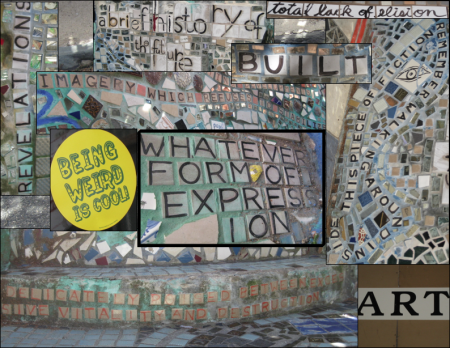Serendip is an independent site partnering with faculty at multiple colleges and universities around the world. Happy exploring!

Mosaic
I use several photos of this trip, some key words, and some part of my wall pappers of my phone to create this mosaic. The combination of those element can express my mood and feeling during the trip.

Beauty of Discontinuity
One thing that magic garden impressed most is the diversity of materials they used, I always figured mosaic should be a simple piece of art,but when I walked in the place,the huge art piece made by millions of small ones really shocked me.The use of mirror pieces should be my favorite,since it made the art piece unique to everybody who sees it.The reflection of every visitors can be part of this masterpiece.
In my mosaic, I tried to make scattered picture a whole by putting pictures taken at similar angles aside,from the sky to views downstairs,making it continuous somehow.I also inserted one mosaic of my face in it,half taken at the garden and half taken at night.It's interesting to put broken pieces together and endow a new meaning inside.


Video Mosaic- A Masterpiece of Chaos
I decided to make my mosaic by taking video clips of the mosaics and compiling them together.
The video should be embedded in this post but if it doesn't work the link to view it is: http://youtu.be/rYO7_hYaJxE

Defining Feminism
I found the discussion in class on tuesday very interesting regarding the three waves of feminism and how do you define feminism. In my experience a lot of people I meet outside of the Bryn Mawr bubble view feminism in an negative light or think that it’s not needed anymore. I’m always amazed at the amount of men I meet who are willing to say that there isn’t a need for feminism any more. I have gotten that comment many times but I'm always a little shocked that a man would make that definitive a statement about womens rights. I was thinking from the class discussion on the definition of feminism that I am not sure what definition of feminism I use. I wouldn’t feel comfortable putting my beliefs into a box. For the question of autobiography being a feminist genre I found it confusing at first because as a group we weren’t sure how to define feminism. When I tell people why I think that feminism is important and needed I usually draw on past experiences when I have been looked down on or not allowed to do things because I am female. For example when I was in kindergarten they made the T ball league coed so my best friend Megan and I joined. The coach was annoyed that they had let girls into the league so he wouldn’t let us be in the team photo. So it’s hard for me to say that autobiography is not a feminist genre when that is usually how I express my own feelings regarding why feminism is needed.

Defining Feminism
As someone who's been in primarily female-oriented environments for most of my life, it feels strange how relatively recent feminism has been to me. So it was still something of a trial to define it in a group setting. As a group, we quickly established our opinions on Satrapi's Persepolis - its merits and its fault and where each lay - and the process had me questioning what constituted, not feminist values, but feminism as a whole. My personal opinion: a movement of its scale must be for a people, not for a person. A person may figurehead the movement, but they are still one experience among the whole. Therein lies my discomfort with calling autobiographies a feminist genre - they're meant to showcase one particular person, the writer. I do believe the contents can be feminist - they can display their activism, their beliefs, the people who influenced them. The reaction can be feminist - a reader can admire these same traits and use them as an example for how to steer their life. But as autobiographies are so narrow in that they focus only one on experience out of the whole, I do not see them as feminist. Maybe I haven't read enough of them, maybe I haven't read the right ones, but a life story is still the story of a single life. (I am eager to read the piece that changes my mind though.)

Is the veil liberating?
When I read Persepolis, the idea that some women might want to be veiled didn't even cross my mind. I'm glad someone in class brought up the idea of what women wear in different cultures being liberating. I found some interesting quotes when I looked up why Muslim women wear the veil and if they like to or not.
"Arab-American Diba Rab says she chooses to wear a veil because it acts as an equalizer. 'I want people to see who I am — for who I am — and not for how I look and not for my physical features, but rather my intellectual capabilities," she said.'" http://abcnews.go.com/GMA/story?id=126666&page=1
"I really liked the purpose behind the hijab -- a woman covering herself so that a man should know her for her mind, not her body." http://www.cnn.com/2009/US/08/12/generation.islam.hijab/

Is an Autobiography a feminist genre?
When asked the question "is an autobiography a feminist genre" I struggled to find an answer. I struggled because I am unsure of what exactly feminism is and what criteria has to be meant in order to make something feminism or not. In examining whether or not Persepolis by Marjane Satrapi is feministic, my first thought was yes it is because it is based on a woman's life and is told by a woman but I knew right away that was to simply of a thought. It is simply because not all women consider themselves feminist and not all women write with the intent to spread feminist ideas. So I stepped away from that quick answer and I came to the realization that I had truly no idea. So when we did that exercise in class when you had to choose a side I thought that would help me come up with a final decision but I was wrong. I found myself agreeing with both sides and even more unsure then I was before. So I think my overall struggle in finding an answer to this question stems from the fact I don't really know what feminism is...








